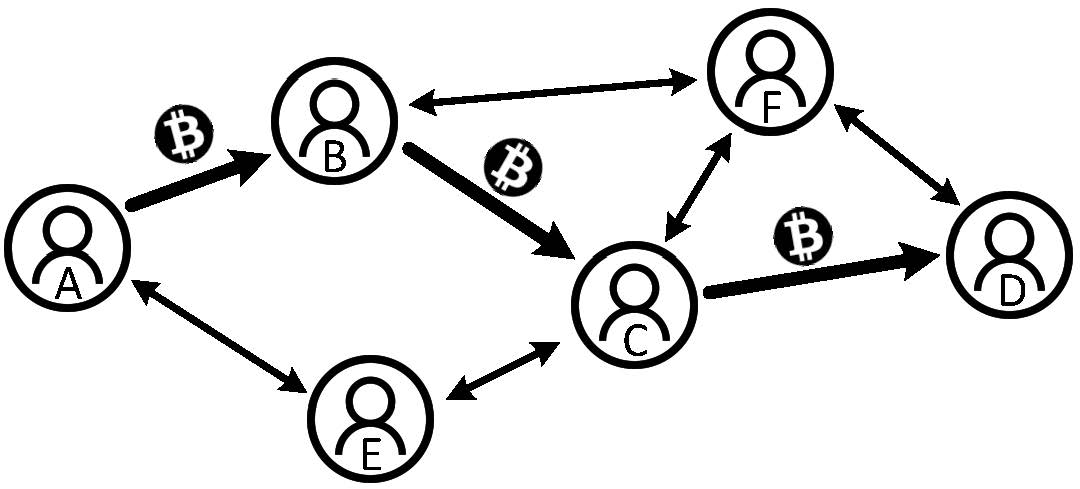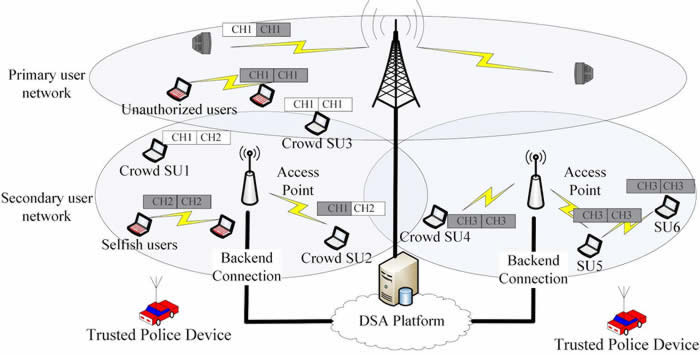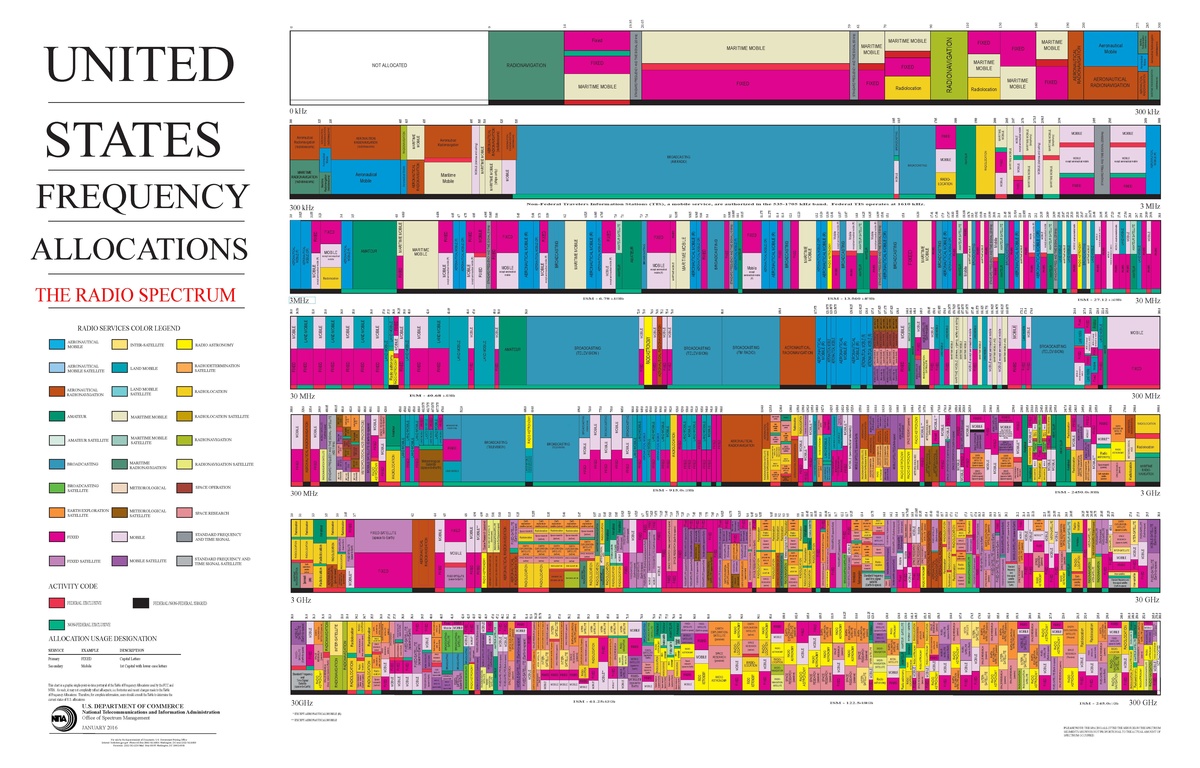Research
Research Statement
A common thread throughout my research endeavors is my problem solving approach. For problems with a centralized administrative control, I strive to obtain a comprehensive understanding of the problem and design simple yet provably good algorithms for finding a solution. To prove the efficacy of these solutions, I use rigorous mathematical proofs, taken from several diverse areas, such as algorithms, combinatorics, convex optimization, and probability. For problems involving independent individual decision-makers, I model the problem as a game and find solutions using game theory, a resourceful mathematical framework originally from economics.
Active projects
Defending Against Sybil Attacks in Crowdsensing

Database-driven dynamic spectrum sharing has been advocated by the Federal Communications Commission as one of the most promising methods to address the spectrum shortage and improve the spectrum utilization. In such a system, a spectrum service provider (SSP) accepts registrations from primary users and determines spectrum availability based on their use of spectrum. Secondary users interested in using the spectrum are required to contact the SSP to inquire about spectrum availability in any band of interest. Leveraging the power of crowd-sourcing, spectrum sensing becomes a key enabler for effectively improving the spectrum-estimation accuracy. In crowd-sourced spectrum sensing, an SSP outsources spectrum-sensing tasks to a large number of recruited mobile users. However, many existing incentive mechanisms for crowd-sourcing are vulnerable to Sybil attacks, where an attacker illegitimately forges multiple identities to gain benefits but degrades the performance. The goal of this project is to enhance crowd-sourced spectrum sensing by designing Sybil-proof incentive mechanisms that overcome the shortcomings of current incentive mechanisms.
Funding: NeTS: Small: Collaborative Research: Enhancing Crowdsourced Spectrum Sensing through Sybil-proof Incentives, National Science Foundation (CNS-1717315), $248,000, 10/01/2017-09/30/2021, PI.
Payment channel networks

The scalability of blockchain-based cryptocurrencies such as Bitcoin and Ethereum hinders their wide adoption. This is due to the massive resource consumption required by their underlying consensus mechanisms for guaranteeing the unique and synchronized global state. To address this scalability issue, Payment Channel Networks (PCNs) have been proposed to enable instant and inexpensive payments without requiring expensive and slow blockchain transactions. However, the concept of PCN is still at its infancy stage, and its fundamental understanding is still lacking. The goal of this project is to conduct a comprehensive study of PCNs from optimization, game theoretic, and economic perspectives, by providing an advanced suite of algorithms, theories, and mechanisms for routing, pricing, and network formation in PCNs.
Funding: Collaborative Research: CNS Core: Small: Cooperation and Competition in Payment Channel Networks: Routing, Pricing, and Network Formation, National Science Foundation (CNS-2008935), $252,000, 10/01/2020-09/30/2024, PI.
Past projects
Crowdsensing-Based Spectrum Etiquette Enforcement

The radio spectrum is becoming an increasingly valuable natural resource nowadays, while it has been shown that much of the spectrum is underutilized in existing licensed bands. To enhance spectrum utilization, dynamic spectrum access (DSA) has been envisioned as a set of promising new spectrum management paradigms, such as spectrum trading/auction and opportunistic spectrum access. While DSA and programmable cognitive radios enable a much higher flexibility of spectrum access, due to the openness of wireless medium, it is also susceptible to various forms of misuse or abuse. For example, unauthorized transmissions without a valid license, or secondary transmissions that intentionally disobey the interference constraints set by the primary users (radios). The misusers will not only gain higher throughput for themselves, but also harm the efficiency of spectrum access operations of normal users (radios). Therefore, enforcing spectrum access rules or etiquettes is crucial to ensuring the ultimate success of the DSA paradigm. This project develops a framework for etiquette and rule enforcing in dynamic spectrum sharing environments.
Funding: EARS: Collaborative Research: Crowdsourcing-Based Spectrum Etiquette Enforcement in Dynamic Spectrum Access, National Science Foundation (CNS-1444059), $140,000, 01/01/2015-12/31/2017, PI.
Spectrum sharing

An intriguing fact emerges during the study of spectrum usage. On one hand, the proliferation of wireless devices, e.g. smartphones, laptops, and tablets, and bandwidth-hungry applications has resulted in the problem of spectrum scarcity. On the other hand, a recent report by FCC reveals that the licensed users are extremely underutilizing the allocated spectrum. To remove the barriers to efficient spectrum utilization, this project aims to 1) design effective spectrum allocation algorithms to allow as many secondary users (SUs) to coexist with the primary user (PU) as possible while taking into account the interference generated by both SUs and PU; and 2) develop incentive mechanisms for enticing spectrum licensees to share or license their under-utilized spectrum for better utilization.
Funding: NeTS: Small: Collaborative Research: Unleashing Spectrum Effectively and Willingly: Optimization and Incentives, National Science Foundation (CNS-1420881), $248,000, 09/01/2014-08/31/2017, PI.